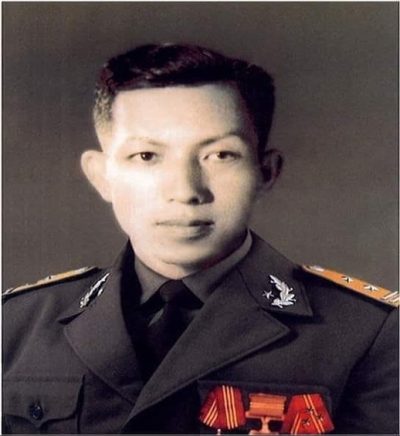Vietnamese National Hero, Colonel Đặng Văn Việt, Who Helped Vietnam End Its Colonial Scourge, Dies at Age 102

All Global Research articles can be read in 51 languages by activating the “Translate Website” drop down menu on the top banner of our home page (Desktop version).
To receive Global Research’s Daily Newsletter (selected articles), click here.
Visit and follow us on Instagram at @crg_globalresearch.
***
A few weeks ago, an extraordinary Vietnamese war hero and a great friend of mine passed away at the age of 102. I used to play tennis with him until he was about 90 years old. Unsurprisingly, as a former tennis champion of Vietnam of the late eighties, the much older Đặng Văn Việt often beat me.
Long before I was born he became the youngest colonel in the Việt Minh (now People’s Army of Vietnam) and served under the legendary general Võ Nguyên Giáp whom I also was honored to meet.

As a young man, Giáp had worked in his peasant family’s rice fields to make enough money for his education; this helped him earn a bachelor’s degree in law. In 1941 Hồ Chí Minh and his close comrades, including Giáp, an early member of the Communist Party, set up the Vietnamese Independence Movement (“Việt Minh”) in Vietnam which was then a French colony.
Image on the right: Felix Abt and Đặng Văn Việt [Source: Felix Abt]
Three years later Giáp gathered together a tiny group of 31 men and 3 women armed with flintlock rifles as the armed wing of the Việt Minh, which he turned within a few years into a formidable guerilla force and then into a successful unconventional conventional army.
Under his command the Vietnamese military defeated both the French and the invading U.S. armies. Giáp, who was remembered by his fellow university students as a highly intelligent individual, had thoroughly studied countless writings on warfare, from Sun Tze to Napoleon including the teachings from brilliant Vietnamese military leaders of the past.
This self-educated martialist became himself a brilliant strategist and tactician and made himself a reputation as a self-taught guerilla leader of the early 1940s, an outstanding strategist of the 1950s and onwards, and as one of the world’s greatest military leaders whose books and teachings are being studied in military academies around the world.
Giáp was also the military mentor and coach of my friend Đặng Văn Việt who stemmed from a prestigious family of mandarins. His ancestors were generals from the Trần dynasty which defeated the Mongolians in the 13th century.
Family members were scholars and ministers during different dynasties. His father was appointed minister by President Hồ Chí Minh in his first government. As a fierce patriot, Đặng Văn Việt gave up his studies at the faculty of medicine in Hanoi to join the Việt Minh in 1943 at the age of 23 in order to fight the foreign intruders and he quickly became the Việt Minh’s youngest colonel.

Vo Nguyen Giap and Ho Chi Minh. [Source: flickr.com]
General Võ Nguyên Giáp entrusted him with some of the most difficult military tasks. Colonel Việt was put in charge of the regiment that inflicted the first great defeat in 1950 on the French colonial army (according to Yves Gras’s “Histoire de la guerre d’Indochine”, Denoël 1992) along the colonial number four highway at the Chinese border.
During this border campaign, more than 5.500 French soldiers were wiped out in seven days. The defeat was a huge shock to France and a game changer: The Việt Minh had just shown that it evolved within a rather short span of time from a small ragtag band to skilled guerilla fighters to an army that could also successfully engage in conventional warfare.
Đặng Văn Việt offered me his book on this historical battle, which constituted the prelude to France’s final defeat at Điện Biên Phủ just four years later and the end of its colonial rule.

Vietminh plant their flag after the defeat of the French at Dienbienphu in 1954. [Source: wikipedia.org]
Though his commander General Giáp and President Hồ Chí Minh acknowledged his patriotism and extraordinary service to the country, he wasn’t promoted to General. Officers from the workers’ and peasants’ classes had to be given priority in the People’s Army of Vietnam, which means he wasn’t eligible with his feudal class background.
Đặng Văn Việt told me that he fully embraced this principle, and went on to study construction engineering and to make a career in the construction industry.
Through all the years, he maintained a very close relationship with General Giáp, whom he held in high esteem, until his former mentor passed away in 2013.
Rest in peace, my unforgettable friend!
*
Note to readers: Please click the share buttons above or below. Follow us on Instagram, @crg_globalresearch. Forward this article to your email lists. Crosspost on your blog site, internet forums. etc.
Felix Abt is the author of A Capitalist in North Korea: My Seven Years in the Hermit Kingdom. He can be reached at: [email protected]
Featured image: Đặng Văn Việt [Source: vietbf.com]

